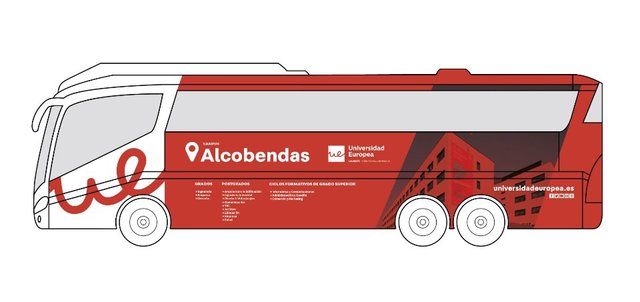3rd International Project meeting - INCLUDED Madrid 30-31 May 2022
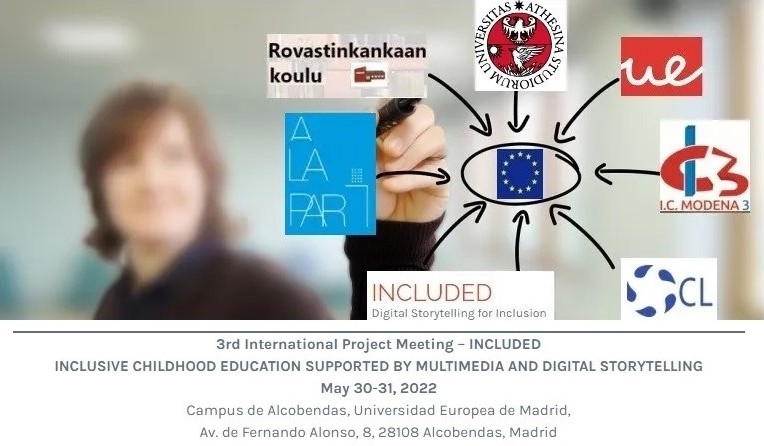
INCLUSIVE CHILDHOOD EDUCATION SUPPORTED BY MULTIMEDIA AND DIGITAL STORYTELLING
- Event type: Private Partner's Meeting
- Official partners invited (INCLUDED Project Erasmus+): Istituto Comprensivo 3 Modena (Italia, IT) Computer Learning (Italia, IT) Università degli Studi di Trento (Italia, IT) Fundación A LA PAR (España, ES) Universidad Europea de Madrid (España, ES) Rovastinkankaan koulu (Finlandia, FI)
- Date: May 30-31, 2022
- Place: Alcobendas Campus, Universidad Europea de Madrid, Av. de Fernando Alonso, 8, 28108 Alcobendas, Madrid
- Download the planning...
ACTIVITIES PLANNING
DAY 1. MAY 30, 2022
May 30th, 2022, AULA N202, Alcobendas Campus, Universidad Europea de Madrid.
9:00. Welcome at Universidad Europea de Madrid
9:30. INCLUDED IO4 GUIDELINES ON TANGIBLE DST FOR INCLUSIVE EDUCATION
- 9.30. IC3MO & CL: Report on best educational practices in Italy.
- 10.00. RK: Report on best educational practices in Finland.
- 10.30. A LA PAR: Report on best educational practices in Spain.
- 11.00. UNITN: Scientific Observation Report.
11:30. Coffee break.
12.00. UEM: Draft plan for IO4 guidelines on tangible TDST for inclusive education.
12:30. Working on included IO4 guidelines on tangible TDST for inclusive education - 1
- A LA PAR, IC3MO & RK: Best practices achievements.
- UEM, UNITN & CL:
- Tangible DST for inclusive classroom (paradigm, SoA, methodology).
- Teacher training guidelines
13:30. Lunch time at Universidad Europea de Madrid
14:30. Working on included IO4 guidelines on tangible TDST for inclusive education - 2
- A LA PAR, IC3MO & RK, UEM, UNITN & CL: Guidelines on tangible DST strategies for inclusion:
- Tangible DST for inclusive classroom (paradigm, SoA, methodology). Defining the pedagogical framework of innovation of the paradigm and methodology of T-DST, as a powerful mean to tackle school inclusion and contrast ESL and disadvantage in current multicultural contexts of primary schools’ educations (IO1).
- Best practices achievements. A resume of the results, best practices and case studies selected from the school experimentation, with related scientific evaluation (IO2 & IO3).
- Teacher training guidelines. A reference guideline for schools, public bodies, organization focusing on teacher vocational training willing to implement training practices and courses on tangible DST for inclusive education (IO2). This section will contain competence reference framework for educators, T-DST training model, best training practices.
- Guidelines on tangible DST strategies for inclusion. A guideline to be used directly by any school institute (primary school) and teachers willing to implement the methodology of T-DST in their work practice. By leveraging on the outcomes of all other IOs, this part will contain competence requirements, best educational/instrumental settings, best project practices. As for the best practices, the e-document will directly relate to the project results of IO2 provided in a proper section of the online platform (documentation of educational projects + digital video artefacts produced by children).
- Conclusion. A conclusion, laying the basis for future work, by envisioning: 1. the roadmap/recommendations for a further implementation, assessment, acknowledgement of the T-DST model of practices within the current curriculum framework in National and EU policies, in synergy with the initiatives addressing school inclusion/digitally supported education; 2. a plan of future projects of research and experimentation leveraging on the T-DST paradigm, expanding the educational community beyond current stakeholders and involving different focuses/specific goals (as, for e.g., special therapies, art education, animation to reading, etc.).
17.00. End of the working session.
DAY 2. MAY 31, 2022
May 31st, 2022, Auditorium, Alcobendas Campus, Universidad Europea de Madrid.
9.30-19.30. Public Workshop at Universidad Europea de Madrid “6TH CONFERENCE ON EDUCATION AND AUTISM SPECTRUM DISORDER & INCLUDED INTERNATIONAL MULTIPLIER EVENT” (Full Program...)
16.00-16.30. Keynote speech. INCLUDED EXPERIENCE IN ITALY.
- Fabio Filosofi (simultaneous translation ITALIAN to SPANISH).
16.30-17.00. Keynote speech. INCLUDED EXPERIENCE IN FINLAND.
- Jaana Pellonpää (simultaneous translation FINNISH to SPANISH).
17.00-17.30. Keynote speech. INCLUDED EXPERIENCE IN SPAIN.
- Cristina Alonso Campuzano.
Universidad Europea de Madrid - Campus de Alcobendas
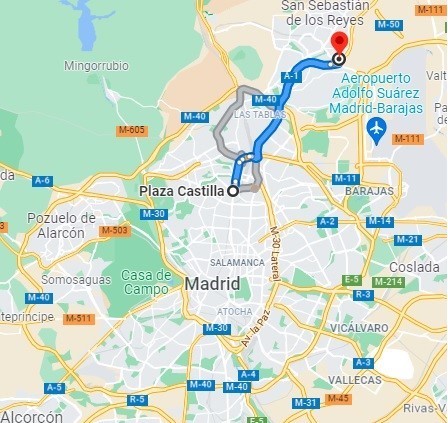
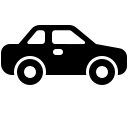
Salida 17 de la carretera A1
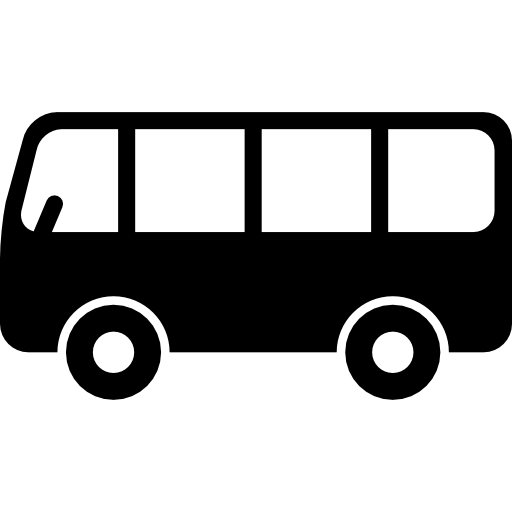
Línea 827. Canillejas - (parada Avenida de Barajas)
Línea 159. Plaza de Castilla - (parada Avenida de Barajas)
Línea 9. CC. Cercanías Alcob. (parada Rotonda Avenida de Barajas c/ Avenida de la Vega) - no circula sábados y festivos
Línea 2. Metro Moraleja Av. Bruselas - (parada Rotonda Avenida de Barajas c/ Avenida de la Vega) - no circula sábados y festivos
Línea 10. CC. Cercanías Alcob. - (parada Rotonda Avenida de Barajas c/ Avenida de la Vega) - sí circula sábados a partir de las 9h40m
Línea 11. CC. Cercanías Alcob. - (parada Rotonda Avenida de Barajas c/ Avenida de la Vega) - sí circula sábados a partir de las 9h40m
Consulta aquí los horarios de la lanzadera.
